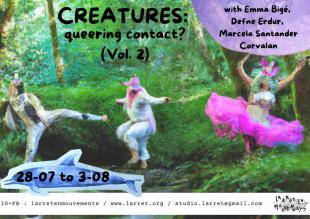CREATURES: queering CI

A week of overwhelming queer contact improv near a forest, crossed by practices of consent, queer somatics and theories, and the co-construction of refuge. The event is self-generated, but co-facilitated by Emma Bigé, Defne Erdur & Marcela Santander Corvalán. Beginners are welcome!
!! Registration is OPEN only to RACISEE people until May 15!! all others can register, but they will join the WAITING LIST!
REGISTRATION
Fill in the form:
https://forms.gle/51T3oq3Tswn7PjKf8
pay deposit to confirm your place :
https://www.helloasso.com/associations/larret-en-mouvements/evenements/creatures-queering-contact-vol-2
Studio 25 jam/lab "improvisation and politics": CREATURES*2: queerizing contact?
By the way, what is contact improvisation (ci)? Contact improvisation is a dance form that invites the masses to meet and intermingle, to roll on the floor and clash in the air. Centered around the study of touch and the sharing of weight with human partners, contact uses tools borrowed from dance, acrobatics, martial arts and somatic practices. It's usually performed in duets or collectives, but can also be performed solo or in relation to the non-human environment.
And what does this have to do with queers? Contact isn't exactly a queer practice. Sure, contact has carried some pretty unique gender and sexuality politics: inspired by Steve Paxton's rather homoerotic piece Magnesium, in which guys who were more or less gymnasts threw themselves at each other, contact came to be one of the first dance forms where the binary roles of strong-men-who-carry and light-chicks-who-are-carried were suspended in favor of more genderfukkk ways of sharing weight between partner-creatures. That said, we're not going to pretend that contact hasn't become a practice that centers mainly on white, cis-hetero-valid experiences, and to be frank: that's what pisses us off. So we ask ourselves: what would happen to contact in an overwhelmingly queer context? What links to queer and non-hegemonic cultures and practices might occur? During the first edition of CREATURES, in 2024, we found ourselves to be mostly trans*, with quite a few radical fairies in the mix; tools were brought in from bdsm practices, others developed trans*ecosomatics of sorts, and a lot of beauty and joy and study and questions around somactivisms, whiteness, humanimal interactions, gender
& sexuality... have emerged. By definition, we have no idea what will happen this time. And we can't wait to find out.
Who, us? The event is co-facilitated by a trio of dancers, Emma Bigé, Defne Erdur and Marcela Santander Corvalán, who bring together somatic and queer theories, therapeutic knowledge (particularly related to trauma healing) and bits of contemporary dance. The three of us are crossed by cis, trans, fèm, butch, latinx, brown, white, queer, dyke, bi, hetero, French, Chilean, Turkish, crip, neurotypical, neurodiverse and crazy experiences. All three of us are contact addicts, but also lovers of solitude and solo dancing, and we place consent, sex-positive spaces and the “co-construction of refuges for rare creatures” (in the words of our chaer amix A* Livingstone) at the heart of our practices.
What's going to happen? The facilitators propose some common moments and a few classes to get the ball rolling, but apart from that, CREATURES is a self-organized event based on inter-teaching. Participants are invited to propose practices and spaces. Our facilitation consists of accompanying the daily self-organization of collective life, and a few introductory courses (consent in a dance context, contact for debutanz, queer theory...).
And where does it take place? Larret is a collective space in the Dordogne region of southwest France. There are two indoor studios, an outdoor dance terrace and a garden. And we're surrounded by a forest with a magnificent river for swimming. The space is not wheelchair accessible (more info in the geohistory section below).
How much does it cost? The price (315-400€) covers the cost of renting the studios, food, lodging and a small salary for the facilitators (which will be donated to transfeminist associations in France and Turkey this year). It's possible to ask for a discount or free admission, with no need for justification - we'll average the need for reduced prices and grant what's possible once material costs have been covered. (More info in the budget section below).